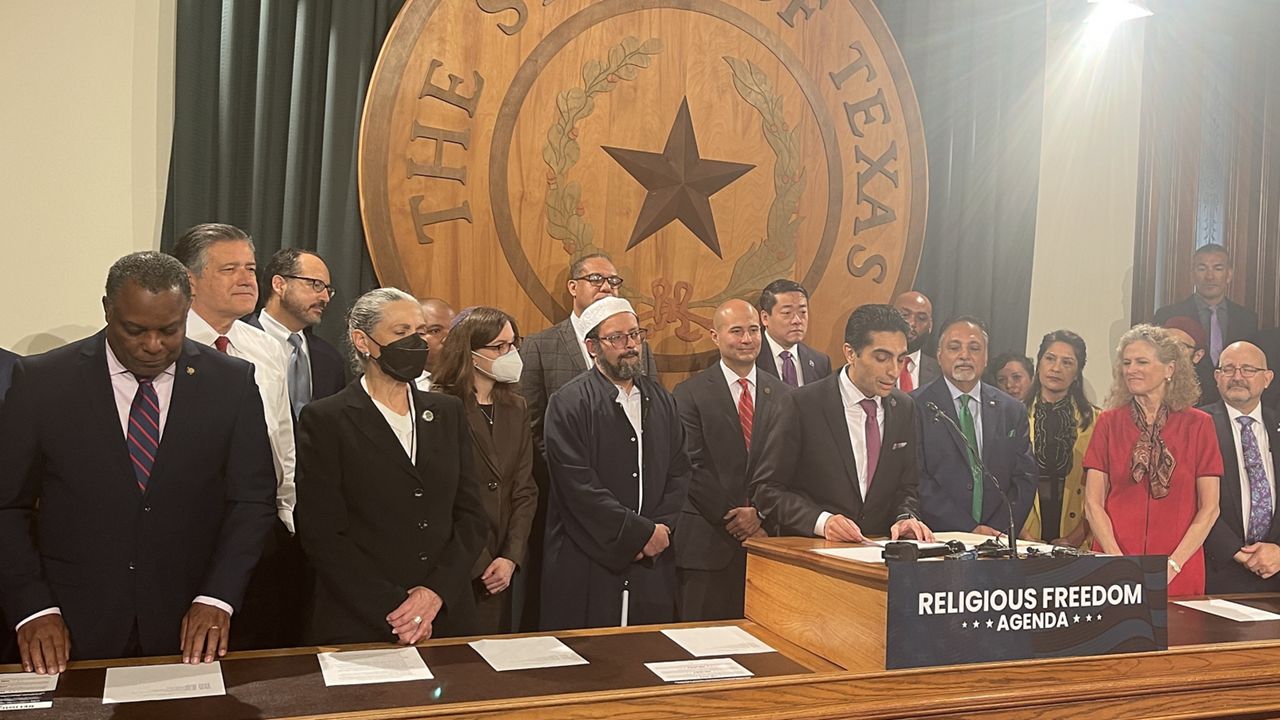AUSTIN, Texas — A trio of bills, filed by one of the first Muslims elected to the Texas House, would expand religious freedom beyond those rights typically granted to those who follow the Judeo-Christian tradition.
A bipartisan, and even bicameral, group of lawmakers joined Rep. Salman Bhojani, D-Euless, on Tuesday morning to announce the bills. As he opened the news conference, Bhojani, a first-term House member, said the Quran in his office is opened to a verse known as Sarah Al-Hujurat, a passage that talks about God’s creation of nations and tribes.
“God is creating humans in different groups, so that we can get to know one another, build cooperative relations and focus on what we have in common, regardless of differences,” Bhojani said of the passage as he described why he had filed three religious freedom bills.
The Texas legislature has a mixed record on broadening religious freedom. Lawmakers passed a ban on sharia law courts in 2018 after conservative media publicized what they called "rogue Islamic courts" in Dallas. And in 2016, Gov. Greg Abbott attempted to opt out of a federal refugee resettlement program that would have primarily served to relocate Syrian Muslims to Texas.
The three bills are simple. One would expand the list of state-optional holidays with paid time off. The current list includes Rosh Hashanah, Yom Kippur and Good Friday. House Bill 1882 would expand that list to include All Saints Day, Diwali, Eid al-Adha, Eid al-Fitr, Passover, Vaisakhi and Vesak, which encompasses the Muslim, Sikh, Hindu and Buddhist faiths, as well as the holy days of Judaism and Christianity.
A second bill, House Bill 1883, would ensure that mandatory STAAR and end-of-course assessments do not conflict with religious high holidays. End-of-course tests typically occur in late fall, and STAAR assessments occur in late spring.
Rabbi Kelly Levy, an eighth-generation Texan, said her family fled religious persecution in Eastern Europe and arrived in Texas before it was a state. Children of multi-faith backgrounds, like her daughter, should not feel less than their peers in the classroom.
“As an elementary student in San Antonio, I distinctly remember feeling left out during the winter holidays,” Levy said. “As a middle school and high school student, I remember feeling frustrated that I had to make up tests and quizzes that were given during the high holidays, the most sacred days of the year for Jews. I was angry I had to fight to receive an excused absence from school to attend Rosh Hashanah and Yom Kippur services.”
Bhojani has had his own run-ins with anti-Muslim rhetoric. Five years ago, incumbent Rep. Jonathan Stickland, R-Bedford, warned his constituents that Bhojani, then a candidate for Euless City Council, was a danger to the community as a Muslim and a liberal Democrat. He pointed to Bhojani's sponsorship of a Muslim Scout Troop that read the Quran, for the first time, at a Euless City Council meeting.
Stickland left the legislature in 2019. Bhojani now sits in what was Stickland's seat. Only a tiny fraction of his district is Muslim.
"I think God has the mysterious way of working things out," Bhojani said. "And I'm really honored to be here and to represent everybody; not just Democrats, but independents, Republicans and my entire district I have."



